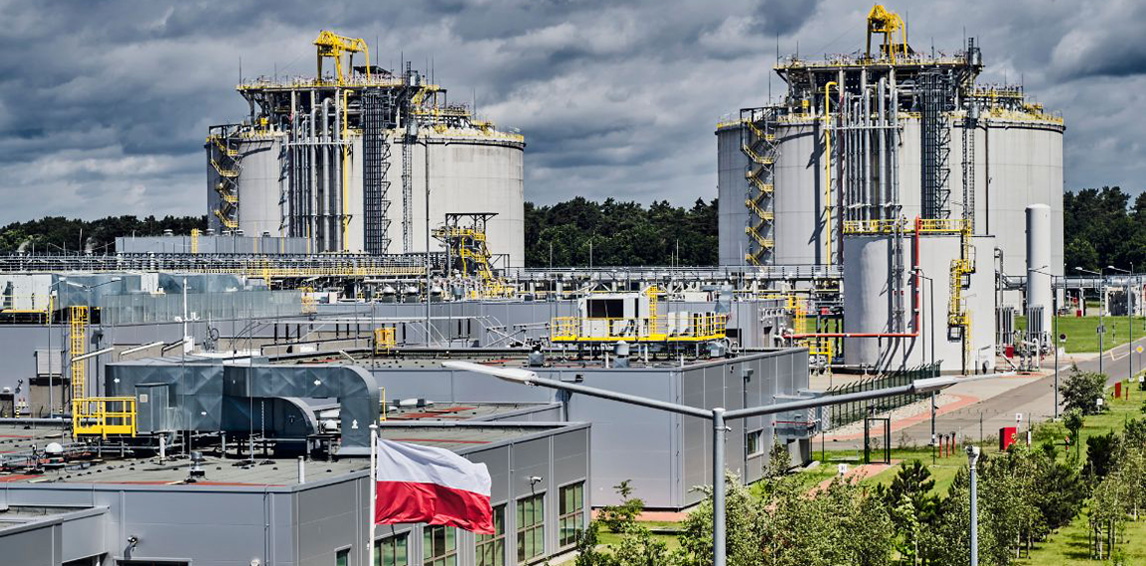Poland will change its laws to better protect the energy sector from acts of pre-war sabotage. The people will have to bear with the inconveniences. However, they will be smaller than the consequences of a successful attack – writes Wojciech Jakóbik, editor-in-chief at BiznesAlert.pl.
- The Government Plenipotentiary for Strategic Energy Infrastrcuture Maciej Bando revealed that new regulations are being prepared to better protect infrastructure from sabotage. His office confirms this.
- The exclusion zone around the Polish LNG port with a radius of 200 meters is still a compromise between security and public expectations. In the corridors, one can hear about the need to expand it.
- Strengthening the defense of critical infrastructure is an important signal for investors, some of whom, e.g. ABB that is closing its plant near Łódź, are beginning to list „geopolitical considerations” among the reasons for withdrawing from Poland.
Pre-war energy industry
Each year the GAZTERM conference in Międzyzdroje offers the opportunity to talk about energy security in the gas sector. The Amber Baltic hotel offers the guests a view of the expanding LNG terminal, which became one of the contexts of the discussions. This facility is of strategic importance for the Polish economy and more. It allowed us to go through a process of accelerated diversification when Russia turned off the gas tap in the spring of 2022. Two years later, it is surrounded by an exclusion zone due to the growing risk of sabotage. This threat looms over the sector, and the government is planning new regulations to enhance security.
„Today’s times should be regarded as pre-war, just like PM Doland Tusk said. […] Today, the main weapon is not Mr. Kazio with a rock, but Mr. Kazio flying a drone near critical infrastructure. Security must be a priority in cyber and physical terms,” said Maciej Bando, the Government Plenipotentiary for Strategic Energy Infrastrcuture. The Minister responded in this way to the prominent statement made by the Prime Minister of Poland, Donald Tusk, who acknowledged in foreign media that Europe was in pre-war times and must be prepared for a new reality It is worth reading Marcin Karwowski’s text on protecting existing energy infrastructure from asymmetric attacks.
„Russian actions, sabotage or diversion, will intensify and this will require us to concentrate,” Prime Minister Donald Tusk said at a press conference on May 14, during which he revealed the transfer of an additional 100 million zlotys from the Prime Minister’s Reserve to the Internal Security Agency and the Intelligence Agency. The security community calls for similar treatment of military intelligence and counterintelligence. It is worth recalling that the Military Counterintelligence Service predicted the invasion of Russia in Ukraine, proving its effectiveness.
New rules on protecting infrastructure
Minister Bando also revealed that new regulations are being prepared to better protect infrastructure from sabotage. His office has confirmed this. „Ensuring careful protection of the supervised energy infrastructure, the Government Plenipotentiary for Strategic Energy Infrastructure issued a request to companies managing strategic energy infrastructure, i.e. Gaz-System, PERN and PSE to propose legislative changes that will ensure better protection of critical infrastructure. This is being currently analyzed” he said in a reply to questions from BiznesAlert.pl.
The public may not learn the detailed provisions of this matter, and if they do appear, they will likely be discussed in the less publicized but important Standing Subcommittee on Critical Infrastructure, Mining, and Energy. It is there that new regulations may be discussed, such as the notable provisions introduced by the Ministry of National Defense in 2023 regarding shooting down threats to the energy sector from the sea. An important lesson will come from Ukraine, which is struggling with a wave of Russian attacks on its energy infrastructure: power plants, combined heat and power plants and transmission lines. Elements of gas transmission infrastructure are also increasingly being targeted, and the fuel infrastructure has already been almost completely destroyed.
This is a new reality that will change the lives of ordinary citizens. „Do we allow such a possibility that someone who is physically guarding critical or strategic infrastructure will block access to the territory of a power plant, gas or oil port, or electricity networks?” asked the Government Plenipotentiary for Strategic Energy Infrastructure Maciej Bando.
Security costs, but its absence costs even more
From this point of view, it should be emphasized that the exclusion zone around the Polish LNG port with a radius of 200 meters is still a compromise between security and public expectations. In the corridors one can hear about the need to expand it in order to better protect the facility. Similarly, the zones may include the naftoport and other elements of critical and strategic infrastructure in the energy sector. They may encounter a negative social response, as in Świnoujście, where some residents complain about tourist losses associated with strengthening the protection of the LNG terminal. However, it is worth imagining what losses in tourist revenue and more a sabotage of such a facility would cause.
Western officials in many countries warn that before the European Parliament and presidential elections, the Western world must reckon with a new wave of attacks, including the sabotage of critical infrastructure. The Financial Times warned on May 6 that Vladimir Putin was planning such attacks across Europe and investigators were looking for a Russian lead in the latest arsons, train derailments and other incidents. The energy sector has experienced this in the case of the sabotage of Nord Stream 1 and 2, the disruption of the Balticconnector gas pipeline and the blackout of Bornholm due to a mysterious failure of the energy cable. Better safe than sorry. We need to keep an eye on the Baltic!
Society has to deal with difficulties, which, however, should allow it to function safely. In fact, the lack of new security solutions would threaten with a real deterioration in the quality of everyday life through acts of sabotage that cut off access to critical services. Strengthening the defense of critical infrastructure is also an important signal for investors, some of whom, like ABB closing the plant near Łódź, are beginning to list „geopolitical considerations” among the reasons for withdrawing from Poland.









